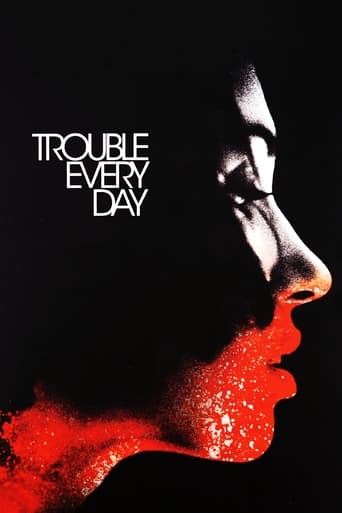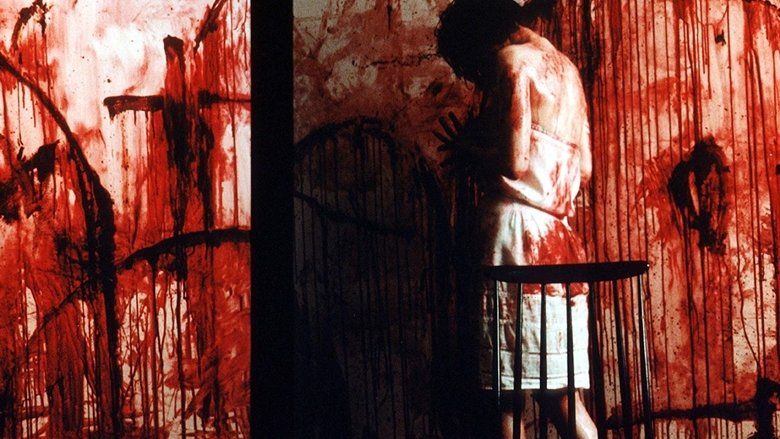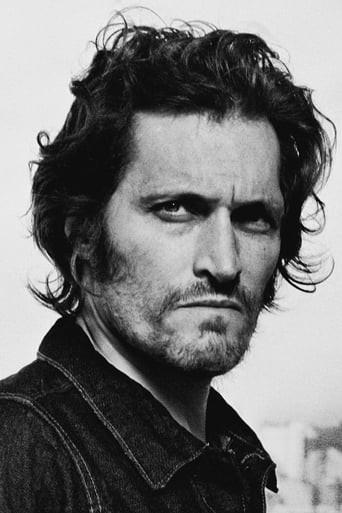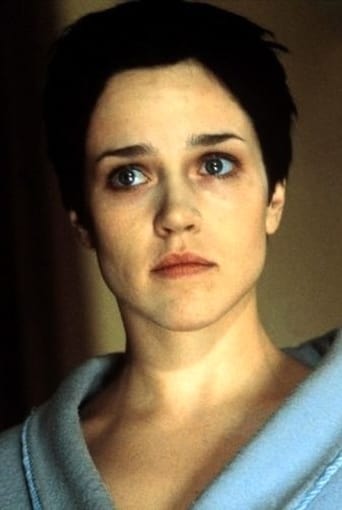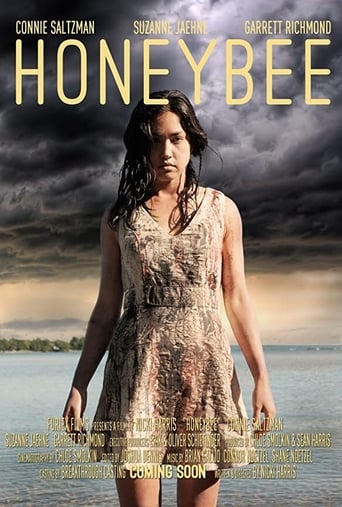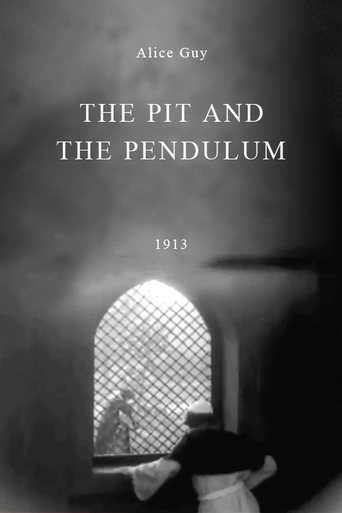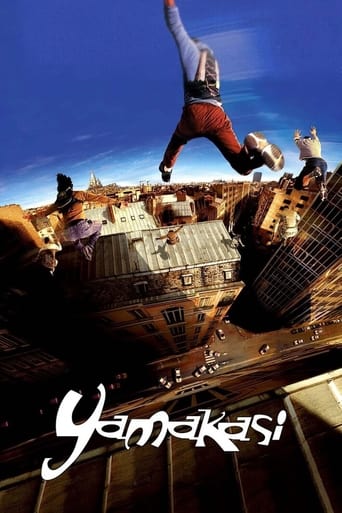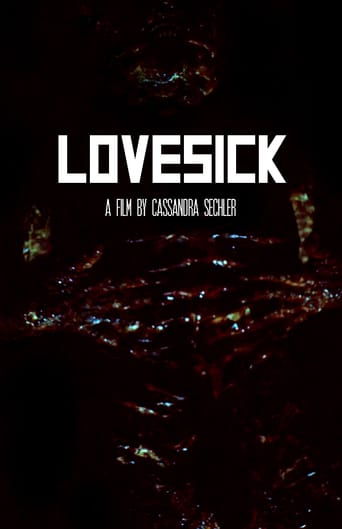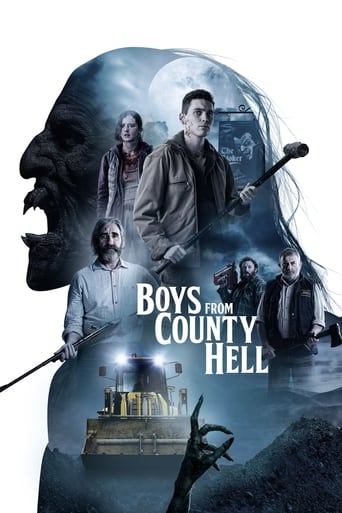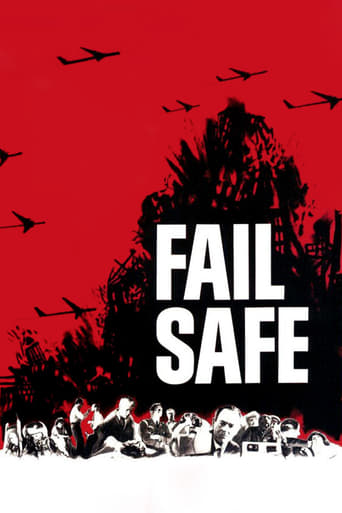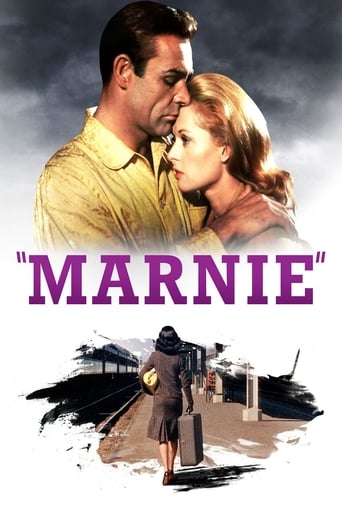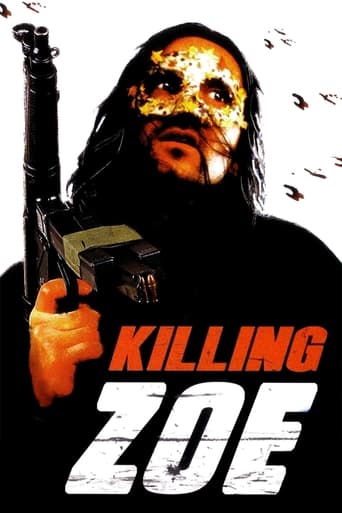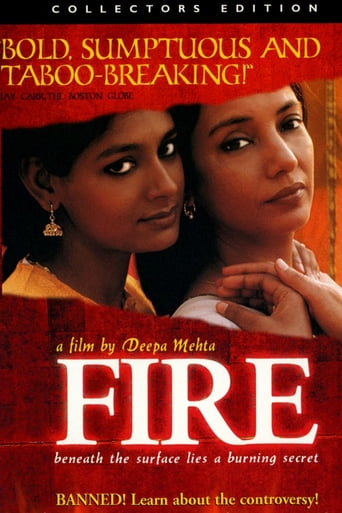Trouble Every Day (2001)
Shane and June Brown are an American couple honeymooning in Paris in an effort to nurture their new life together, a life complicated by Shane’s mysterious and frequent visits to a medical clinic where cutting edge studies of the human libido are undertaken.
Watch Trailer
Cast


Similar titles
Reviews
I don't have all the words right now but this film is a work of art.
Entertaining from beginning to end, it maintains the spirit of the franchise while establishing it's own seal with a fun cast
The movie turns out to be a little better than the average. Starting from a romantic formula often seen in the cinema, it ends in the most predictable (and somewhat bland) way.
The film's masterful storytelling did its job. The message was clear. No need to overdo.
Claire Denis' "Trouble Every Day" stars Vincent Gallo as Shane, a scientist who once worked in South America. There he contracted a super virus which turns those it infects into lusty cannibals. Much of the film watches as Shane struggles to not devour his wife. His urges are instead directed toward the necks and genitalia of anonymous women, whom he murders and then devours. Because the virus is spread during intercourse, Shane avoids having sex with his own wife. Shane's story is mirrored to another scientist, played by Alex Descas, whose wife was infected by the virus. She feverishly consumes men, but avoids harming her husband.Throughout the film, Denis contrasts cannibalistic sex with tenderness. The husbands – one essentially celibate, the other craving sex – do not have intercourse with their wives, and so engage in tender rituals instead (hugging, caressing, washing etc). Elsewhere sexual desire is seen as something which is hidden in order to protect the spouse from violence.This is all pure Freud. Freud believed that human nature emerged from two basic instincts: Eros and Thanatos. Eros is the instinct for life, attraction, reproduction and love and Thantatos the instinct of death, repulsion and aggression. This drive is active not only in every creature, great or small, but also in every cell of every organism, as the metabolic processes active in all cells have both constructive (anabolic) and destructive (catabolic) functions. Subsequent philosophers, like Lacan and Marcuse, then took this further. For them, desire is inherently insatiable, manically seeks an imaginary wholeness, unity or completion, and, failing to achieve this, either escalates into violent extremes, or engages in incessant games of transfer, a desire for one thing transmuted into a desire for another. In this way, desire is itself the death drive, in so far as its ultimate, unconscious goal is the transcendental annihilation of the Self and so the satiation of desire. The psychic end point of sex is itself a kind of cannibalistic consumption or orgasmic annihilation of both self and partner. "Trouble Every Day" - its title alluding to the body's daily struggles - also offers the flip-side to Denis' "I Can't Sleep". "Sleep" was preoccupied with the illusory nature of the "image of ultimate enjoyment", and the depths of its power over us. It illustrated that there is no outside, no space beyond the world of dissatisfaction and lack, and was obsessed with the inherent incompleteness of enjoyment, its limits and partiality. The film then proposed that, though there is no object that can satisfy desire, one can find satisfaction through the act of desiring itself.Unlike "Sleep", though, "Trouble" deals with extremes. Denis asks "what is a kiss?", "what is sex?", and then offers both up as a kind of devouring. For Denis, both the kiss and the sex act attempt to bridge the gap between bodies, both futile attempts to get inside and destroy and transcend the limitations of fleshy desires. Here, not only do love and sex point to gaps which can not be filled, but to violent things. Whether it's the fact that most abusers claim to love their victims or whole nations "civilizing" indigenous populations in the guise of "Christian love", love is oft linked with violence and violence always carries a sexual element. Consider the way the word "f**k" may mean either "make love to" or "do great violence to", the way "I love you" and the possessive "I want you" seem to operate in the same space, or the way cuteness triggers expressions of aggression (to squeeze, squish and hug) in the brain. For Denis, love can be something destructive, irrational, suppressive and imbalanced. It is also often narcissistic. It is one's own ego, made real on the imaginary level, that one loves when "in love", as "to love" is "to wish to be loved". A deception involving giving what one does not have, what is "truly sought" in love is thus something experienced as painfully or fearfully missing from one's life. Love thus has a selfish and power element, its desire masking a more hidden desire: to gain some control over helplessness. We see this in the film, with two characters who feverishly chase the next fix. But we also see examples of sacrificial love. Here, love is to want nothing of the partner and to sacrificially give everything. The film's ending, though, suggests that such virtuous love is itself hostility; the protected partner wants to be consumed."Trouble's" aesthetic is bizarre. The film's a minimalist re-imagining of vampire mythology, with subtle references to Nosferatu, Frankenstein, cannibalism, Christian communions and much vampire, werewolf, incubi and succubi imagery. There are also nods to Nicholas Roeg's "Don't Look Now", Gallo resembling both the lead in that film, and a young Edgar Allen Poe. His lover, meanwhile, resembles Rosemary's Baby's" Mia Farrow. And while vampire tales oft have their lusts reactivated by mythical forces, Denis does the opposite, the viral lusts aligned to a kind of unchecked corporate greed; capitalism run amok and bent on devouring.The film is relentlessly ambiguous, familiar patterns are subverted and Denis' plot is presented in tangential, hinted terms, with key occurrences omitted. Unsurprisingly, the film is obsessed with skin, mouths, and the surfaces of bodies. Denis' camera lingers on stomachs, flesh and arms, only to then tear them open with bloodied fangs and nails. Love and violence, kiss and bite are shown, not in a dialectic of opposites, but in a mutual excitation and exasperation, each asking the other to go further, to go all the way to the end, to get completely lost.On the downside, the film possesses a terribly written flashback sequence, is repetitive, and some very interesting angles (did Gallo's character steal the virus? Is the virus penance for his theft? Has the virus been spread by infidelity?) are left unexplored.7.9/10 – Worth two viewings.
Beatrice Dalle is a hypnotizing presence to me. Clair Denis has an ability to cover and penetrate the skin. She is a Jarmusch who can put his abstract angst in estrogenal terms, with as much cinematic competence. There is a tendency to compare her to Catherine Breillat. That is a mistake we guys make because both see as women. But Brellait is all about damage, the inevitability of damage. Denis on the other hand is about hope as an urge among desperate urges. They couldn't be more different.These two women, Dalle and Denis have an understanding and make something here. It is not comfortable. For many of us, I can imagine it will be destabilizing because this really could be a deep as real pain. This is not a horror movie. It is a love story, like "Realm of the Senses," or "Pillow Book," but instead of allowing us the safety of "watching," it forces us to inhabit the fear of passion.And. And it is from a woman who, for instance, knows that when you photograph skin, it is the movement of hair that matters, and when you get intimate, the hairs must be those finest, those ones that only a lover sees and makes move. Gallo is an intelligent actor. He is unafraid to go to these places. In a way, this is a woman's "Brown Bunny." He helps a lot. In the background are clueless beauties, men and women, who are destroyed, like the cars in an action movie's chase scene.Dalle made this the same year she made "H Story," which I count as one of the purest of film abstractions. It worked in part because she pulled nervous sweat and menstrual blood into those abstractions. Here she does precisely the opposite. She really does need to be celebrated.You may want the much tamer adventures in this domain: "cat People," Or even the lesser "The Hunger."We need to have a way to indicate a commercial airliner arriving that is better than the shot used here — and 100,000 other places. The song over the end credits is a pretty marvelous appreciation of Frank Zappa, whose earliest song provides the title. That music had the same sort of visceral, destructive purity.Ted's Evaluation -- 3 of 3: Worth watching.
From what I've read of him, I do not like Vincent Gallo as a person, and he often physically repulses me. In Trouble Every Day, he does physically repulse me more than ever, yet I do not dislike him in his role. What I must say impresses me about Gallo is his ability as an actor, including performances under his own writing and direction, to play roles devoid of any of the ego that he defensively projects what I've read of his off-screen life and that are crippled by hopeless insecurity and apprehension, which he showcases without a hint of inhibition or unintended uneasiness. That is why I believe he continues to find work in movies in spite of the unbelievable amount of projects from which he was fired or walked away, the amount of people he claims to hate, and the mind-blowingly infuriated critical and audience reaction to his sophomore effort at the helm, The Brown Bunny. All-embracing filmmakers see him as one of the very few actors who has no problem baring himself for a performance as a truly pathetic character. In this film, he is honeymooning with his wife in Paris superficially in an effort to nurture their new life together, however the core reason is so that he can visit a medical clinic where studies of the human libido are undertaken. He hopes to rid himself of the bloodthirsty urges that have always plagued him.The real shock found in this film is my surprise introduction to Beatrice Dalle, who I have never before seen in a movie and near whom I hope to be wearing football gear inside the Batmobile if I ever see her in person. As a doctor's wife who is psychologically in ruins due to a mysterious overextention of her libido and is too dangerous for her husband to let her free from the bedroom during the day, she reaches as deeply into the most basic appetitive animal instincts as she is capable and plainly ensues as a nightmarish monster of berserk chaos. It was clever of writer/director Claire Denis to cast two notoriously wild atypical people of extremity in their roles.Denis's scenes of gore, which due to her focus on the morose feelings of the characters, mainly Gallo, his wife, and Dalle are intermittent and often difficult to anticipate, are extremely disturbing. During a scene where Dalle attacks a person's flesh as they lay in shock, barely able to scream, the sounds made by both Dalle and her victim are heard just barely over the glum, cheerlessly jazzy score. In the other scenes of violence, Denis's wise discerning between the appropriate placement or absence of music asserts a very moving outcome.Though I was expecting a grittier cinematographic delivery, the film is stirring, well made, and metaphorically interpretable.
Voodoo-practitioner Afro-French male doctor's sex-toy creature allowed leaving her locked room by a hypnotised curious intruder being consumed during copulating, is overpowered by a strong American happened to drop in into a doctor's house at the timing, who had since then fallen into her footsteps of a thirst for blood and flash during orgasm.A perverted love of "Dracula" mixed with an unstoppable quest for sadist sex of "Frisk", framed with Parisian charm makes this terrific film realistic to a degree of a potential usage by anti-AIDS and pro-obscenity campaigners.Highly recommended.

